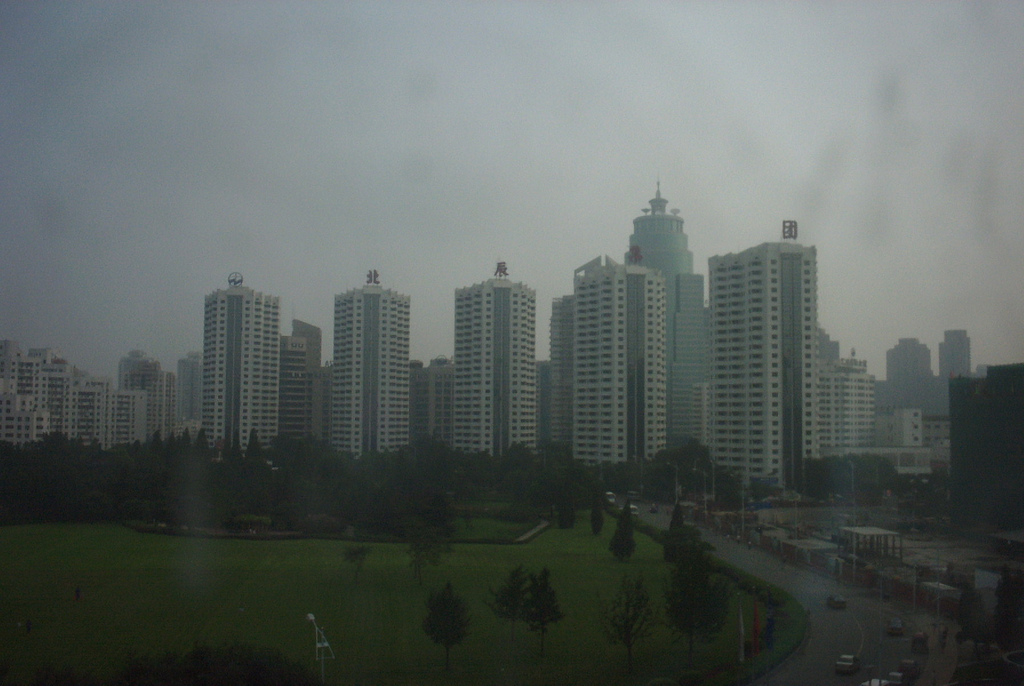China's Pivot on Climate Change and National Security
For decades, China was reluctant to deem climate change a national security issue, preferring instead to view it through the lens of development. The driving concern behind China’s reticence was sovereignty; Beijing feared that crisis rhetoric about climate change would be used to legitimate interventionist actions on the part of Western powers, including forcing Beijing to curtail its economic growth.

Published by The Lawfare Institute
in Cooperation With

For decades, China was reluctant to deem climate change a national security issue, preferring instead to view it through the lens of development. The driving concern behind China’s reticence was sovereignty; Beijing feared that crisis rhetoric about climate change would be used to legitimate interventionist actions on the part of Western powers, including forcing Beijing to curtail its economic growth. Influential Chinese commentators called efforts to limit emissions “a conspiracy by developed nations” to contain the Middle Kingdom’s development, even as the Chinese military quietly acknowledged in a 2010 white paper on national defense that climate change contributes to security concerns. While the U.S. military recognized climate change was a potential national security issue in 2008, that same year, Chinese state media featured an editorial warning against “sensationalizing [climate change] as a security issue.”
The official positions of the U.S. and China have reversed in recent years. Despite decades of acceptance among U.S. military and civilian national security leadership that climate change poses a threat to U.S. interests, the Trump administration has continually questioned the fact of climate change itself and pushed to revoke assessments that climate change is a critical threat to U.S. national security and military readiness. In contrast, Beijing in 2017 broke with decades of reluctance to label climate change as a security issue by signing onto a joint statement with the European Union terming rising global temperatures “a root cause of instability.”
China’s shift from skeptic to true believer on climate change and security is not, for the most part, because leadership has suddenly become convinced that climate change is real. As the Chinese government acknowledged in its most recent comprehensive assessment of climate change, China is already affected by worsened floods, more extreme droughts, diminished fishery productivity and other ecological changes. The government has long understood that a warming climate will threaten the country’s agricultural production, make economically important cities vulnerable to catastrophic flooding and eventually dry out many of the country’s rivers. In particular, scientists predict that China’s northern region—the country’s breadbasket—will suffer crippling droughts, making it increasingly difficult to maintain the ruling Communist Party’s goal of basic self-sufficiency in key crops. China is already one of the most water-scarce countries in the world, and in the decades to come, this scarcity is projected to get much, much worse as the flow of rivers fed primarily by meltwater decreases sharply toward the end of the century.
The embrace of climate and security instead reflects a calculation that embracing the issue can enhance China’s legitimacy at home and its influence abroad. While breathless claims that China is the world’s “green superpower” should be taken with a big grain of salt, Beijing’s resolve on climate and energy policy is nonetheless real, driven by concerns about the impacts of environmental change on both domestic and international stability.
Domestically, dangerous levels of air pollution have become one of the leading grievances of the country’s rapidly expanding and politically important urban middle class. The persistence of poor air quality (in spite of prodigious efforts to improve it) remains perhaps the most visible sign of the limits of the Chinese Communist Party to provide public goods to its citizens. The party remains keenly aware that as incomes of its urban residents increase, their demands for improved environmental quality will also rise. But it’s not just the urban areas that threaten the party’s legitimacy; dirty coal-fired power plants are also a leading source of protests in the provinces. This has convinced Beijing to pursue aggressive policies to reduce the importance of coal in the country’s energy mix—a major cause of China’s slowed growth of greenhouse gas emissions between 2013 and 2016.
Beijing is also aware of and concerned about the effects of climate change on its vulnerable and already discontented rural and minority populations, who disproportionately bear the impacts of a changing climate. These effects of growing water scarcity, declining agricultural productivity and increased desertification are likely to be felt most intensely in regions with sizable minority populations such as Inner Mongolia, Xinjiang, and Tibet. Beijing has attempted to address some of these impacts, for example, by announcing plans to relocate Tibetan nomadic herders, allegedly to help protect the fragile high-altitude environment.
But it’s not just the impacts of climate change on China’s internal stability that worry Beijing. Increasingly, blunting the effects of climate change both in its regional neighborhood and possibly beyond is becoming an important component of Beijing’s foreign and security policy. The Chinese Academy of Sciences in 2017 advised in an official report that “water resources scarcity issues will become the core issue in the development of countries along the Belt and Road.” China is also increasingly sensitive to allegations, especially from India, that it is attempting to control and disrupt the flow of major rivers, most of which, such as the Brahmaputra and the Mekong, originate within China. Over a billion people will be affected by Chinese decisions related to water from the Tibetan plateau. As a result of its trillion-dollar Belt and Road investment program, Chinese companies, citizens and the state itself are increasingly exposed to climate-related security issues such as extreme flooding and drought, migration and protests over Chinese-financed infrastructure construction. China is also keeping a wary eye on climate impacts further afield. In 2011, facing its worst drought in recorded history, the Chinese government bought grains on the international market, doubling global wheat prices, which some analysts have linked to the discontent that fomented the Arab Spring. It is no exaggeration to say that, in the coming decades, China’s response to climate change as it relates to agriculture, water and flooding will have profound impacts on billions of people.
A third dimension of China’s understanding of the nexus between climate change and security pertains to diplomatic and geopolitical influence. Climate policy has long been one of the biggest divides between the U.S. and its European allies, a fact that hasn’t been lost on China’s leadership. The Trump administration’s effective withdrawal from the Paris Agreement has created a leadership void with the European Union that China has been keen to exploit, as its 2017 joint statement on climate change and stability suggests. At the same time, China’s armed forces have been steadily enhancing their ability to respond to natural disasters, providing yet another means for China to project its soft power with respect to climate change. Indeed, in this respect China has significant experience to offer: Its armed forces have for decades been closely integrated with civilian authorities for flood and drought response and, as a result, offer sophisticated disaster response capabilities.
These three concerns—domestic stability, international stability and international influence—have all had a tangible impact on domestic Chinese energy policy. Despite being the world’s largest greenhouse gas emitter since 2005, and burning more coal than the rest of the world combined, Beijing has created the world’s largest carbon market, pumped approximately twice as much money into renewables as the United States, and surpassed the United States in terms of both the number of electric vehicles on the road and the number of publicly available charging stations. It has also committed to peaking its emissions before 2030 and is mulling some truly transformational steps, such as banning nonelectric cars. Many of China’s climate measures rely on government support in the form of subsidies, including for electric vehicles (contrast that with Trump’s proposal, which has support from Republicans in Congress, to end subsidies for electric vehicles).
How much credit Beijing deserves for these efforts is a different question. China, like the United States, has shown a reluctance to move too quickly or adopt any climate policies that might limit its economic growth. It will be a long time before China’s carbon market is fully operational, and even then, the cap may be too weak to drive reductions. And despite major strides in building out renewable capacity, renewables are absorbing additional demand but for the most part not displacing fossil capacity. Simultaneous with its renewables build-out, China is also locking in fossil fuel emissions for decades to come by continuing to build coal plants at home and by funding coal-fired power plants around the world, from Pakistan to Serbia. China has also been accused of flouting the Montreal Protocol on the ozone layer by releasing chemicals that deplete the ozone layer and are themselves greenhouse gases.
It’s therefore unsurprising that China’s stance on climate change presents a puzzle for outside observers. It takes the threat of climate change seriously, yet much like the United States, its policies are shaped by a much more hard-nosed assessment of its own political, economic and security interests. The key point—from the perspective of climate change—is that while Beijing has increasingly embraced the position that climate change poses a security risk, this philosophical stance has not yet translated into any actual reductions in the country’s emissions, much less a case for the dramatic economic transformation necessary to keep the world from disastrous warming.






